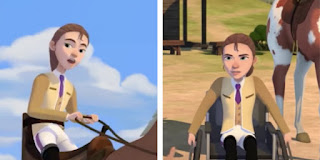I intended to write about BBC2's When Barbra met Alan as soon as I heard about it. Everyone who knows me knows how much respect and admiration I have for JackThorne. There's a lot to be said about people who advocate but more for those who continuously go around breaking down barriers, and creating change while enabling those unheard voices to be heard.
The same goes for Ruth Madely, Ruth was one of the first disabled people I remember seeing on screen when I became disabled. Ruth continuously fights for accurate disabled representation both on and off-screen. I don't admire Ruth because she's disabled I admire her dedication, determination, devotion to her craft and for always speaking out about how she wants to make a change for young disabled people, so they grow up seeing themselves.
Something she never experienced in her childhood.
As someone obsessed with television, a person who felt very alone when she became disabled as she hardly saw anyone representing her way of life, my heart was bursting with possibilities of what I now thought I could achieve.
seeing that many disabled people on screen and knowing they were also behind it meant more to me than I can explain. Not only that it was beautifully written shot edited and everything in between.
Arthur and Ruth are both incredible actors, as I said I knew who Ruth is I'd never heard of Hughes before this drama, but now I'm planning to go and see him in Richard111 or at least try to find a recorded version after.
The night when Barbra met Alan premiered and for many days after my timeline was full of disabled individuals, confused at why they had never up until now heard of Barbra Lisicki and Alan Holdsworth, I hadn't myself but put it down to general ignorance of not taking the time out to learn about my rights or the fight for them.
As I was pondering this a Facebook memory popped up from this time last year, a post asking for thoughts and opinions on Netflix's CripCamp documentary as I planned to write an article for PosAbility. Until watching CripCamp I knew nothing of disability history, as this was an American documentary I never stopped to question it. I presumed that because it wasn't English history it had passed me by. Another vital thing to mention before I go on is that most of these activists are still alive. 1990 wasn't that long ago nor was 1995, there's an awful lot of recent history we should be learning about. Last year BBC2 aired an incredibly moving documentary titled Silenced: The hidden story of disabled Britain presented by Cerrie Burnell, other than cripcamp this was the first time I'd ever seen anything like this on TV.
It made me question and ingrained into me, even more, how little I know about disability history, the fight for access and my rights both in the U.K and abroad. I was never taught about any of this, all I know of disability history and rights I've learned through Instagram posts or the very few documentaries I've found.
As a society over the past few years in particular we've begun to become more inclusive within our curriculum, coming a massively long way. Especially when accurately representing and educating on forgotten and largely ignored parts of society's history. This hand-in-hand along with tailored historical months has gone a long way to educating those previously unaware.
I want more than that. One step from disability history month would be seeing disabled history and rights education added to the curriculum or even just talked about more openly within schools.
The Educating of Society starts with the classroom. If we begin to educate future generations they will grow up to be more well-rounded inclusive individuals. The Helen Keller, tik tok trend, from last year, comments and articles surrounding the Queen using a wheelchair as well as those that came after Liza Minnelli was seen using one at the Oscars, go a long way to proving my point.
Maybe if we taught young people about disability, its history and the struggles disabled individuals face they might Start to listen and learn.
In writing this I hit a stumbling block when no one I knew had anything to add. After multiple attempts to get people to send quotes or reasons why they felt this was important, I began to feel quite sad and confused about why I felt so passionate when no one around me seemed to understand.
I thought about it for a while then realised maybe once again it comes down to education if we begin to educate our children they will then educate their parents, friends, and family members, therefore, creating a society full of people who are not only educated but hopefully open to learning more teaching others and taking these lessons around with them in their daily lives.
I feel passionate about this for the same reason I feel passionately about how disability is represented in the media, film, and television, things I've always been interested in, where I couldn't see myself when I became disabled.
I started blogging to try and reach young disabled people, allow them to see themselves, show them what is out there and make them believe anything is possible, I haven't succeeded in that mission yet but I continue as I mean to go on, keep writing and keep finding ways to get these messages across hoping at least one person is listening.
I also plan on writing a letter to CBBC to see if I can get them to do a horrible history disability episode, absolutely no idea if this will work but it's worth a try. If you've gotten this far, thank you for reading, and welcome back to my blog. I hope to be able to write more soon.
.jpeg)













